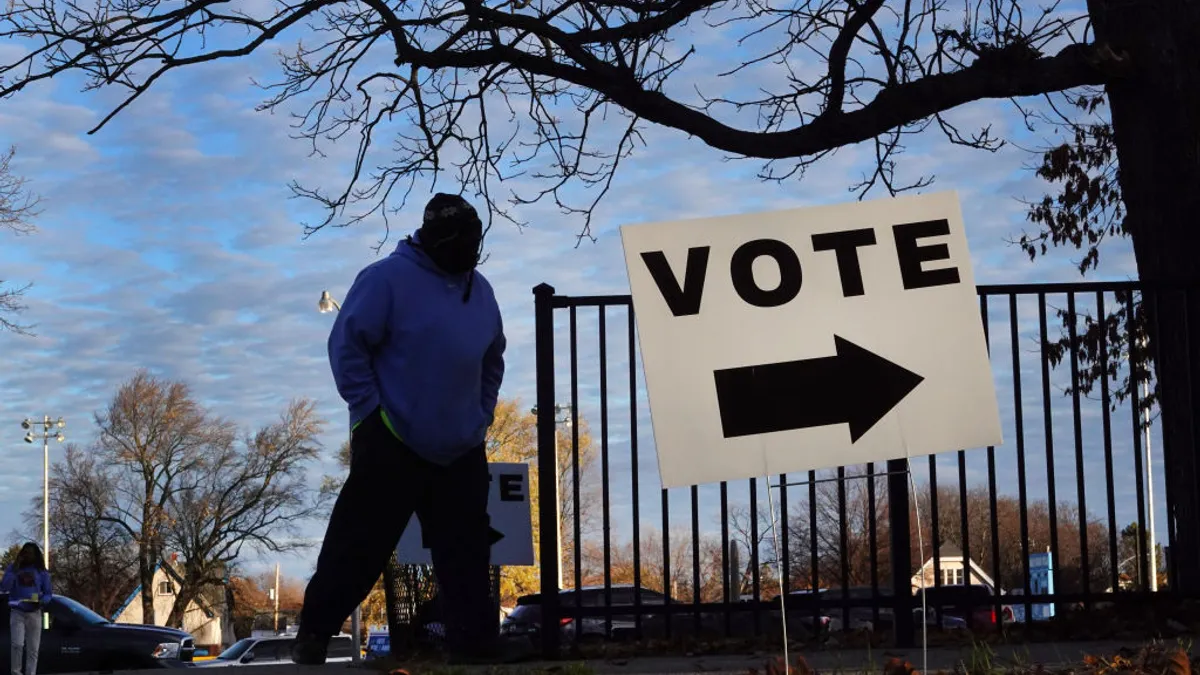Voters in Maryland and Missouri passed state ballot measures seeking to legalize adult marijuana use, according to the results of Tuesday’s 2022 U.S. midterm elections, adding wrinkles to an already complex compliance landscape for HR professionals.
Meanwhile, marijuana legalization measures in Arkansas, North Dakota and South Dakota failed. The latter result marked a notable reversal, given that South Dakota voters initially passed a recreational legalization amendment during the 2020 elections. But the state Supreme Court later upheld a lower court’s ruling that the 2020 ballot initiative violated South Dakota law.
| Initiative | Passed (Y/N) |
|---|---|
| Arkansas Issue 4: Marijuana legalization for adults 21 years and older | Y |
| Colorado Proposition 122: Characterizing as natural medicine, and decriminalizing personal use, possession, growth and natural transport for persons 21 years and older of, certain psychedelic plants and fungi | Y |
| Maryland Question 4: Marijuana legalization for adults 21 years and older | Y |
| Missouri Amendment 3: Marijuana legalization for adults 21 years and older | Y |
| Nebraska Initiative 433: Raising the state’s minimum wage from $9 to $15 by 2026 and annually adjusting the minimum wage thereafter by the cost of living | Y |
| Nevada Question 2: Raising the state’s minimum wage to $12 an hour by July 1, 2024, removing existing annual inflation adjustments to the minimum wage and allowing the state legislature to pass a law setting the rate of increases higher than the constitutionally mandated minimum | Y |
| North Dakota Statutory Measure 2: Marijuana legalization for adults 21 years and older | N |
| South Dakota Initiated Measure 27: Marijuana legalization for adults 21 years and older | N |
| Tennessee Constitutional Amendment 1: Adopting a right-to-work amendment to the state constitution. | Y |
| Washington, D.C. Initiative 82: Gradually eliminate the city’s tip credit for tipped employees and raise the minimum wage for tipped employees to equal that of non-tipped employees by July 1, 2027 | Y |
Marijuana laws ranked as one of the five most challenging multijurisdictional compliance issues in an Ogletree Deakins survey of in-house counsel and senior HR professionals published in April. Workplace safety is intertwined with marijuana legalization; a 2021 National Safety Council survey found that one-third of employees had seen workplace cannabis use during work hours, even as less than half of organizations surveyed had a written policy addressing cannabis.
Colorado, the first U.S. state to legalize recreational cannabis use, is poised to extend legalization to other drug categories. Voters there approved a ballot measure to categorize certain psychedelic plants and fungi — such as dimethyltryptamine, or DMT, and psilocybin — as “natural medicines” and decriminalize the personal use, possession, growth and transport of such medicines for adults 21 years old and older.
The Colorado measure contains language indicating that it would not require employers to permit or accommodate use in the workplace. Similarly, Missouri’s initiative appears to permit employers to discipline employees for on-the-job marijuana use. Attorneys who previously spoke to HR Dive said that employers may need to take a closer look at their drug testing policies to ensure these policies address compliance, safety and recruiting concerns.
On the horizon: A new round of minimum wage increases
With the federally mandated minimum wage stagnant at $7.25 an hour since 2009, Tuesday’s election results saw a continued trend of voters choosing local increases that will put local minimum wage rates above the federal minimum.
Nebraska and Nevada will both push their minimums above the $10 per hour mark within the next decade. Nebraska voters approved a measure to incrementally raise the state’s minimum wage to $15 an hour by 2026, with annual adjustments to account for inflation thereafter. In Nevada, voters approved a measure that will not only boost the state’s minimum to $12 an hour by July 2024, but also revise Nevada law to remove existing provisions for annual adjustments and allow legislators to set increases beyond the constitutionally mandated minimum.
Two additional jurisdictions voted on measures that proposed eliminating their respective tipped minimum wage provisions, also known as tip credit laws. Washington, D.C., voters approved Initiative 82, which will eliminate the city’s tip credit through gradual increases until July 2027, by which time the minimum wage for tipped workers will equal that of nontipped workers. Voters in Portland, Maine, rejected a similar proposal on Election Day.
The mostly positive outcomes for minimum wage increase proposals will pile onto state- and local-level increases that are already set to take effect in 2023 and beyond. At least 13 states will see their minimum pay rates increase next year at a time when employers may need to consider increasing pay as workers deal with inflation’s effects.
Tennessee passes right-to-work law
Tennessee joined at least nine other states in voting to adopt a constitutional amendment prohibiting workplaces from requiring workers to join a union as a condition of employment, also known as a right-to-work amendment. The Volunteer State has one of the lowest shares of unionized workers in the U.S. according to data from the U.S. Bureau of Labor Statistics, though the state has experienced a slight uptick in unionization in recent years, like other states.
Unionization has become a more prominent topic in the HR space, particularly given high-profile elections at companies like Starbucks and Amazon in 2022. A U.S. Department of Labor analysis found that the number of union election petitions filed with the National Labor Relations Board rose by 58% between October 2021 and June 2022 compared to the same time period the previous year. An August Jobcase survey found that a majority of hourly workers would consider joining a union provided the opportunity arose.
The Biden administration has been active in promoting organized labor, and it created a task force on worker organizing and empowerment. Members of the administration have also supported the Protecting the Right to Organize Act, or PRO Act, which, if passed, would override state right-to-work laws.




















